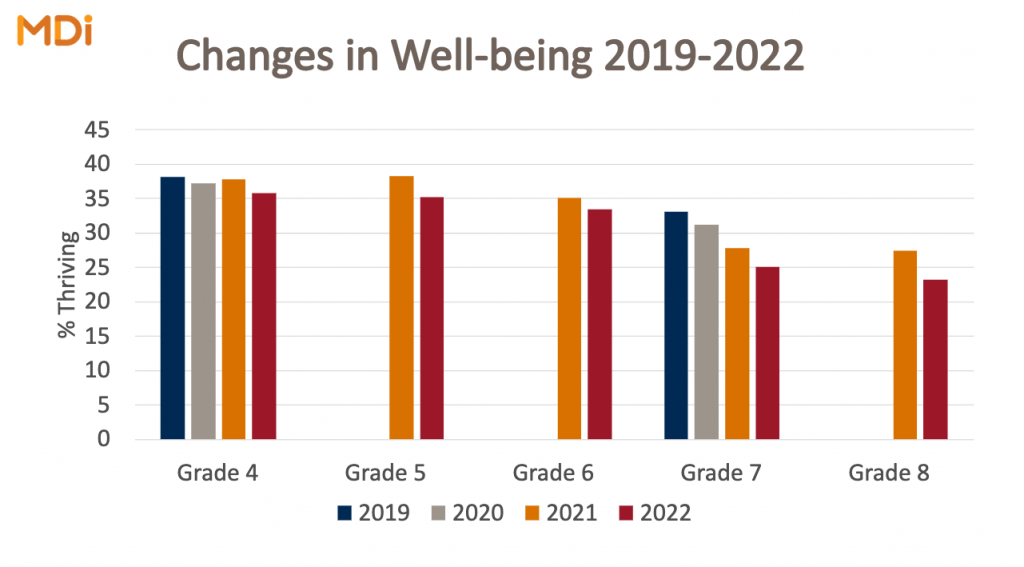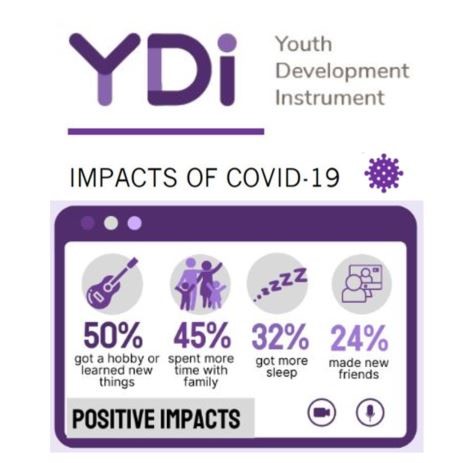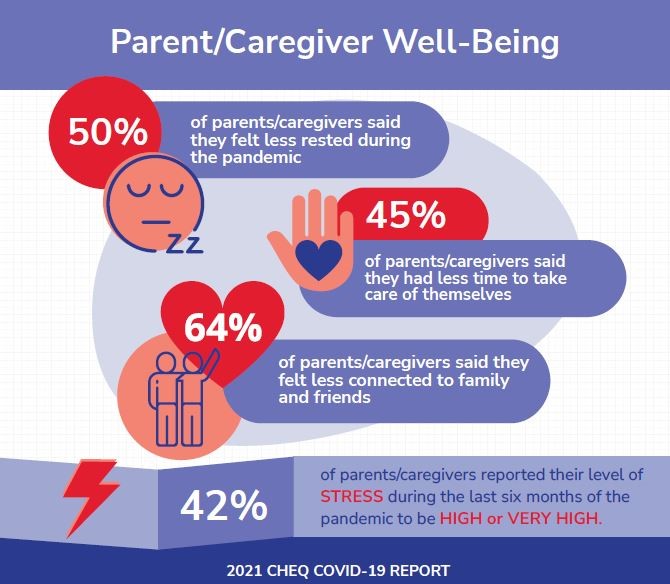As yet another school year draws to an end, HELP is considering what we are learning through ongoing research into the impacts of the pandemic on children, parents and teachers. The disruption of regular routines and support systems has affected children and youth, along with parents and educators across the province’s K-12 education system.
Despite the challenges faced by the education system during the pandemic, BC school districts and school communities not only remained open and adapted to ensure supports were available for families, they also maintained the collection of critical population-level data that provide information on the challenges faced by children and families throughout this period. Data gathered through the Child Development Monitoring System before and during the pandemic are providing initial insights for HELP to explore and mobilize, along with our partners in the health and education systems.
Mental health impacts from the perspective of children and youth themselves
Six school districts participated in Youth Development Instrument (YDI) data collection in 2020-21 academic year. Almost half of the Grade 11 students in these districts rated their mental health as “fair” or “poor,” with 37% and 41% screening positive for depression and generalized anxiety respectively (Samji et al. 2021a, Samji et al., 2021b). Additionally, recent analyses of data from the Middle Years Development Instrument (MDI) from 2019 to 2022 indicated declining trends in children’s self-reported well-being: a smaller proportion of children from grades 4 through 8 reported high levels of well-being during the pandemic in comparison to pre-pandemic years. Grade 4 and 7 students also reported less presence of assets that are important for promoting well-being, including connectedness to adults and participation in after-school activities during the pandemic compared to previous years (HELP, 2022).

There are also changes in activities for younger children. Data collected in the fall of 2021 from over 5,000 parents and caregivers of kindergarten students using the Childhood Experiences Questionnaire (CHEQ) found that approximately 40% of the children in these families were getting less than the recommended 60 minutes per day of physical activity, and 44% were spending more than the recommended time for preschoolers on screens (HELP, 2021).

At the same time, these same data illustrated a number of positive impacts of the pandemic: 50% of youth who participated in the 2020-21 YDI data collection reported they started a hobby or learned new things, 45% reported spending more time with family, and 32% reported getting more sleep (Samji et al., 2021). Research analyzing MDI data from a large urban district, both pre- and during the pandemic, also found that students reporting improvements in relationships with parents and other adults at home during the pandemic were more likely to report higher levels of well-being (Gadermann et. al, 2022). A proportion of families who participated in the CHEQ data collection also indicated positive changes: 42% reported spending more time playing and 21% reported spending more time eating meals together during the pandemic (HELP, 2021).
Adult mental health needs our attention too
These data also illustrate that there are significant impacts on adults as a result from the pandemic. Through the CHEQ, parents and caregivers of young children reported negative experiences such as feeling less rested (50%), less connected to family and friends (64%), having less access to consistent child care (41%), and having less time for self-care (45%). They also reported changes to job status and work hours, with 25% reporting decreases in family income during the pandemic. With all of this in mind, it is not surprising to see 42% of parents and caregivers reporting “high” or “very high” levels of stress (HELP, 2021).
The well-being of educators is also concerning: a joint study by HELP, BCTF and the BC Ministry of Education of more than 1,200 teachers in BC in 2021 found that 80% reported that their mental health had “slightly” or “significantly” worsened since the start of the pandemic. Moreover, 43% of these teachers also felt that students’ social and emotional needs were only “slightly met” or “not at all” in the 2020-21 academic school year (Gadermann et al. 2021).

Societal challenges are compounding pandemic-related impacts
These results reflect the far-reaching, and potentially long-term, impacts of the pandemic. Furthermore, the last two years have brought heightened awareness around health equity issues, systemic and cultural racism, and in 2021, with the Residential school discoveries, about the devastating and ongoing consequences of colonization. At the same time, BC has contended with issues of housing affordability and availability, an opioid crisis and climate-change related wildfires, floods and heat domes.
While the pandemic has impacted all children, not all children have been impacted equally (First Call, 2021; BC Representative for Children and Youth, 2020; Waddell et al., 2020; and Dove et al., 2020). We have much more to learn about how the pandemic and other societal influences are shaping children’s health and well-being. It is HELP’s goal to ensure the essential information gathered from the Child Development Monitoring System is used by government, school district and health administrators, community leaders, families, and other important stakeholders to work collectively to support our children and to navigate the challenges and complexities of this unique time.
Thank you to all of our partners that support this important work!
References:
BC Representative for Children and Youth. (2020). Left out: Children and youth with special needs in the pandemic. Retrieved: http://www.rcybc.ca/reports-and-publications/cysn-report/
Dove, N., Wong, J., Gustafson, R., & Corneil, T. (2020). Impact of school closures on learning, child and family well-being during the COVID-19 pandemic. BC Centre for Disease Control & BC Children’s Hospital. Retrieved: http://www.bccdc.ca/Health-Info-Site/Documents/Public_health_COVID-19_reports/Impact_School_Closures_COVID-19.pdf
First Call Child and Youth Advocacy Society. (2021). 2021 BC child poverty report card. Retrieved: https://still1in5.ca/wp-content/uploads/2021/11/First_Call_Report_Card_2021_Nov_23_web.pdf
Gadermann, A.M., Warren, M.T., Gagné, M., Thomson, K.C., Schonert-Reichl, K.A., Guhn, M., Molyneux, T.M., & Oberle, E. (2021). The impact of the COVID-19 pandemic on teacher well-being in British Columbia. Human Early Learning Partnership. http://earlylearning.ubc.ca/
Gadermann, A., Thomson, K., Gill, R., Schonert-Reichl, K.A., Gagné Petteni, M., Guhn, M., Warren, M.T., Oberle, E. (2022). Early Adolescents’ Experiences During the COVID-19 Pandemic and Changes in their Well-being. https://pubmed.ncbi.nlm.nih.gov/35592082/
Human Early Learning Partnership. (2021). Childhood Experiences Questionnaire: Impact of the COVID-19 Pandemic on the Famliies with Young Children in British Columbia. Vancouver, BC: University of British Columbia, School of Population and Public Health; December 2021. Available from: http://earlylearning.ubc.ca/media/2021_cheq_covid-19_report_final-20211206.pdf
Human Early Learning Partnership. (2021). How Are the Kids? Children’s Perspectives on their Health, Well-Being and Assets both Before and During a Global Pandemic through the Middle Years Development Instrument (MDI) in British Columbia, Canada. Vancouver, BC: University of British Columbia, School of Population and Public Health; June 2021. http://earlylearning.ubc.ca/media/bcteachersandcovid-19surveyreport_062821_final.pdf
Oberle, E., Gill, R., Thomson, K. (2022). Webinar: Three years on – Mental health, early adolescence and the pandemic: What we know from the student perspective. Vancouver, BC: University of British Columbia, School of Population and Public Health; May 2022. Available from: https://discovermdi.ca/register-today-three-years-on-mental-health-early-adolescence-and-the-pandemic-what-we-know-from-the-student-perspective/
Samji, H., Snell, G., del Casal, JM., Low, B., Wu, J., Badar, S., Long, D. (2021). Youth Development Instrument Global Report, 2020-2021. Burnaby, BC: Simon Fraser University. Available from: http://chartlab.ca/wp-content/uploads/2022/02/YDI-Phase-2-Pilot-Global-Report-2020-2021-2.pdf
Samji, H., Snell, G., del Casal, JM., Low, B., Wu, J., Badar, S., Long, D. (2021). Youth Development Instrument Infographics, 2020-2021. Burnaby, BC: Simon Fraser University. Available from: http://chartlab.ca/about-ydi/infographics/
Waddell, C., Schwartz, C., Barican, J., Yung, D., & Gray-Grant, D. (2020). COVID-19 and the impact on children’s mental health: A research report. Retrieved: https://rcybc.ca/wp-content/uploads/2020/11/Impact-of-COVID.pdf
